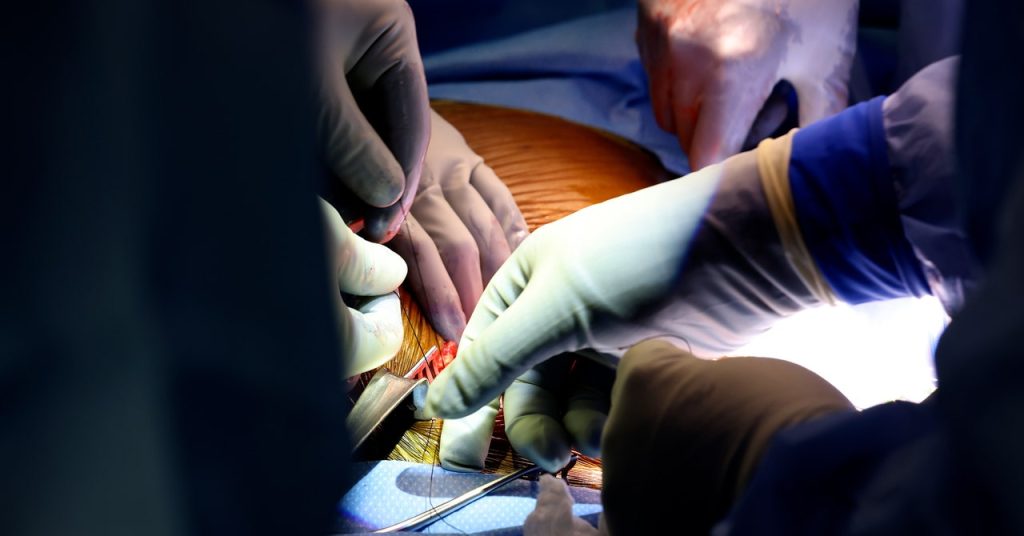Pioneering Pig Kidney Transplant Offers Hope Despite Risks
Balancing Immunosuppression and Infection
Infection remains a significant hurdle in organ transplantation, second only to organ rejection. Physicians must carefully calibrate immunosuppressive medication dosages to prevent rejection while minimizing the patient’s susceptibility to infection. These potent drugs can trigger various adverse effects, such as exhaustion, queasiness, and vomiting.
Optimism for Slayman’s Transplant
Despite the unfortunate outcomes of two previous pig heart recipients, Dr. Riella maintains a positive outlook for James Slayman’s transplant. Slayman’s relatively good health at the time of surgery and his rare blood type, which would have necessitated a 6-7 year wait for a human kidney, make him a promising candidate for this groundbreaking procedure. In contrast, the pig heart recipients were too ill to qualify for human organ transplants.
Innovative Treatment with Tegoprubart
Alongside standard immunosuppressants and close monitoring, Slayman is receiving an experimental medication called tegoprubart, developed by Eledon Pharmaceuticals. Administered intravenously every three weeks, tegoprubart inhibits communication between T cells and B cells, two critical immune cells, thereby suppressing the immune response against the transplanted organ. This drug has previously been used in monkeys that received gene-edited pig organs.
“It’s pretty miraculous this man’s out of the hospital a couple of weeks after putting in a pig kidney. I didn’t think we would be here as quickly as we are.”
Steven Perrin, Eledon’s president and chief scientific officer, expresses amazement at Slayman’s swift recovery.
Genetic Modifications for Compatibility
Dr. Riella is optimistic that the 69 genetic alterations made to the pig that provided Slayman’s donor kidney will contribute to its long-term functionality. eGenesis, the company that supplied the pig, employed CRISPR technology to introduce specific human genes, remove certain pig genes, and neutralize dormant viruses in the pig genome that could potentially infect a human recipient. The pigs are created through cloning, with scientists making edits to a single pig cell and using that cell to develop an embryo. The embryos are then cloned and implanted into a female pig’s uterus, ensuring that her offspring inherit the desired modifications.
Debate Over Necessary Genetic Edits
Scientists disagree on the number of genetic modifications required for pig organs to function sustainably in humans. The pig heart transplants utilized donor animals with 10 edits developed by United Therapeutics subsidiary Revivicor.
Dialysis as a Fallback Option
A crucial distinction between Slayman’s kidney transplant and the previous heart surgeries is the availability of dialysis as a backup plan if the pig kidney fails. The pig heart recipients had no alternative options. Dr. Riella suggests that even if pig organs do not provide a long-term solution, they could serve as a bridge to transplantation for patients like Slayman who would otherwise endure years of dialysis-related hardships.
Overwhelming Patient Interest
“We’ve gotten so many letters, emails, and messages from people volunteering to be candidates for the xenotransplants, even with all the unknowns. Many of them are struggling so much on dialysis that they’re looking for an alternative.”
Dr. Riella highlights the overwhelming interest from patients willing to participate in xenotransplantation trials, despite the uncertainties involved, as a testament to the challenges faced by those on dialysis.
Future Plans and Focus on Slayman’s Health
The Mass General team intends to initiate a formal clinical trial to transplant edited pig kidneys in more patients, having received special FDA approval for Slayman’s procedure. However, their primary focus remains on ensuring Slayman’s continued well-being and recovery.

5 Comments
Layla Campbell: If you thought piggy banks were an interesting use for pigs, just wait till you hear about their kidneys turning into lifesavers!
Well, it looks like bacon isn’t just for breakfast anymore!
Is it just me, or are we starting to take “you are what you eat” a bit too literally?
Pig kidney into a human, what will they think of next, a heart from a shark?
Apparently, playing Dr. Frankenstein comes with a medical degree now!